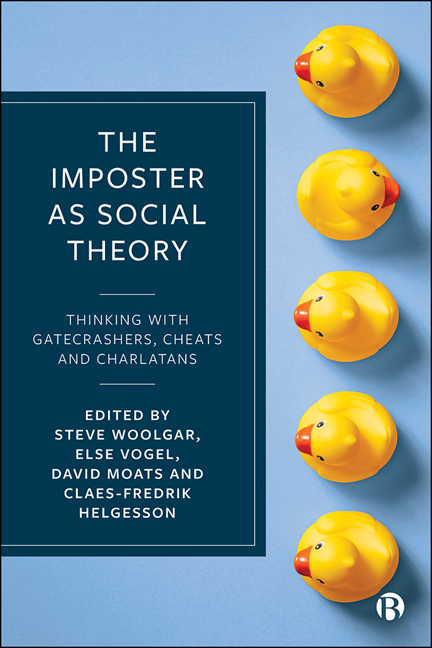Book contents
- Frontmatter
- Contents
- List of Figures and Boxes
- Notes on Contributors
- Preface
- 1 Thinking with Imposters: The Imposter as Analytic
- 2 The Desire to Believe and Belong: Wannabes and Their Audience in a North American Cultural Context
- 3 A Menagerie of Imposters and Truth-Tellers: Diederik Stapel and the Crisis in Psychology
- 4 Learning from Fakes: A Relational Approach
- 5 Imitations of Celebrity
- 6 Natural Imposters? A Cuckoo View of Social Relations
- 7 Conjuring Imposters: The Extraordinary Illusions of Mundanity
- 8 States of Imposture: Scroungerphobia and the Choreography of Suspicion
- 9 The Face of ‘the Other ’: Biometric Facial Recognition, Imposters and the Art of Outplaying Them
- 10 Faking Spirit Possession: Creating ‘Epistemic Murk ’ in Bahian Candomblé
- 11 The Guerrilla’s ID Card: Flatland against Fatland in Colombia
- 12 Good Enough Imposters: The Market for Instagram Followers in Indonesia and Beyond
- 13 Thinking beyond the Imposter: Gatecrashing Un/Welcoming Borders
- 14 Postscript: Thinking with Imposters – What Were They Thinking?
- Index
13 - Thinking beyond the Imposter: Gatecrashing Un/Welcoming Borders
Published online by Cambridge University Press: 22 December 2021
- Frontmatter
- Contents
- List of Figures and Boxes
- Notes on Contributors
- Preface
- 1 Thinking with Imposters: The Imposter as Analytic
- 2 The Desire to Believe and Belong: Wannabes and Their Audience in a North American Cultural Context
- 3 A Menagerie of Imposters and Truth-Tellers: Diederik Stapel and the Crisis in Psychology
- 4 Learning from Fakes: A Relational Approach
- 5 Imitations of Celebrity
- 6 Natural Imposters? A Cuckoo View of Social Relations
- 7 Conjuring Imposters: The Extraordinary Illusions of Mundanity
- 8 States of Imposture: Scroungerphobia and the Choreography of Suspicion
- 9 The Face of ‘the Other ’: Biometric Facial Recognition, Imposters and the Art of Outplaying Them
- 10 Faking Spirit Possession: Creating ‘Epistemic Murk ’ in Bahian Candomblé
- 11 The Guerrilla’s ID Card: Flatland against Fatland in Colombia
- 12 Good Enough Imposters: The Market for Instagram Followers in Indonesia and Beyond
- 13 Thinking beyond the Imposter: Gatecrashing Un/Welcoming Borders
- 14 Postscript: Thinking with Imposters – What Were They Thinking?
- Index
Summary
Hesitation
The song sounded familiar. I had doubtless heard it before. Its lyrics were fervently performed by its interpreters while standing inside a moving bus. This version of Juan Gianitti's El Camino del Dolor – the Path of Pain – was carefully attended to by most of the passengers in the bus. After the song finished, the younger member of the duo saluted the audience and went to every seat to collect coins and food. This was not the first time they had done this, as I could deduce from their skill in managing the movements of the bus while successfully playing the guitar and singing. I was returning from Altos de Cazucà, a slum in a town called Soacha located in the south-west of Bogotà where people moving into the city usually settle after escaping from the still ongoing situation of violence in Colombia. When the duo came off the bus, I decided to join them and initiate a conversation. This impulsive and intuitive act resulted in a revealing encounter with Luis and his son who generously shared their story after I explained my interest in their performance and experiences (Figure 13.1).
When asked about their lives before coming to the city, Luis seemed to repeat the lyrics of the song they had just performed in the bus. Like the song's author, they too had once owned a farm. They lived there until 2008, when an armed group that occupied the region assaulted and assassinated Luis’ wife and daughter before expelling him and his son from their land. “Even if it was safer to go back, I would not do it”, were the words he used to describe their reluctance to revisit a place full of painful memories – their own Camino del Dolor. Luis told me how he moved among different towns trying to find a job and a place to stay with his son. They both claimed to be earning enough money to survive in the city through their performances on buses.
Something drew my attention while talking. Luis constantly asked his son to hand him things or inquired what time it was. I initially interpreted this as their merely being in a hurry. A powerful revelation in Luis’ story, however, suggested more was going on. Luis had a visual impairment and played the guitar by heart.
- Type
- Chapter
- Information
- The Imposter as Social TheoryThinking with Gatecrashers, Cheats and Charlatans, pp. 293 - 316Publisher: Bristol University PressPrint publication year: 2021



